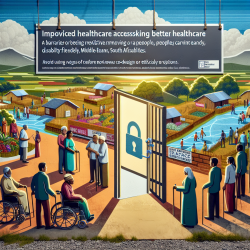As practitioners in the field of special education and healthcare, we continually seek ways to improve the services we provide, particularly to underserved populations. A recent research paper titled Starting with us: Imagining relational, co-designed policy approaches to improve healthcare access for rural people with disability offers insightful strategies that can be applied to our work. The study, published in the Australian Journal of Rural Health, delves into the challenges faced by rural people with disabilities and proposes innovative, relational, and co-designed policy approaches to address these issues.
Understanding the Challenges
The paper identifies several barriers that rural people with disabilities face in accessing healthcare, including:
- Geographical isolation
- One-size-fits-all policy approaches
- Lack of engagement with key stakeholders
These challenges highlight the need for a more nuanced and inclusive approach to healthcare policy design, one that takes into account the unique circumstances of rural populations.
Implementing Co-Designed Policy Approaches
The authors of the study advocate for co-designed policy approaches that involve rural people with disabilities, healthcare professionals, and other key stakeholders in the policy-making process. Here are some practical steps practitioners can take to implement these approaches:
- Engage Stakeholders: Actively involve rural people with disabilities, their families, and healthcare providers in discussions and decision-making processes.
- Foster Relationships: Build strong, trust-based relationships between all stakeholders to ensure that policies are relevant and effective.
- Customize Solutions: Develop policies that are tailored to the specific needs and circumstances of rural communities, rather than relying on generic, one-size-fits-all solutions.
Embracing the Ethics of Care
The study also emphasizes the importance of applying an ethics of care lens to policy design. This approach prioritizes the well-being and dignity of individuals, ensuring that policies are compassionate and respectful. Practitioners can adopt this perspective by:
- Listening to the lived experiences of rural people with disabilities
- Prioritizing their needs and preferences in policy decisions
- Ensuring that policies promote equity and justice
Encouraging Further Research
While the insights from this study are invaluable, there is always room for further research and exploration. Practitioners are encouraged to:
- Conduct their own research to identify specific needs and challenges within their communities
- Collaborate with academic institutions and other organizations to gather data and develop evidence-based policies
- Share their findings and best practices with peers to foster a collaborative approach to improving healthcare access
By implementing these strategies and continuing to engage in research, practitioners can make significant strides in improving healthcare access for rural people with disabilities.
To read the original research paper, please follow this link: Starting with us: Imagining relational, co-designed policy approaches to improve healthcare access for rural people with disability.










